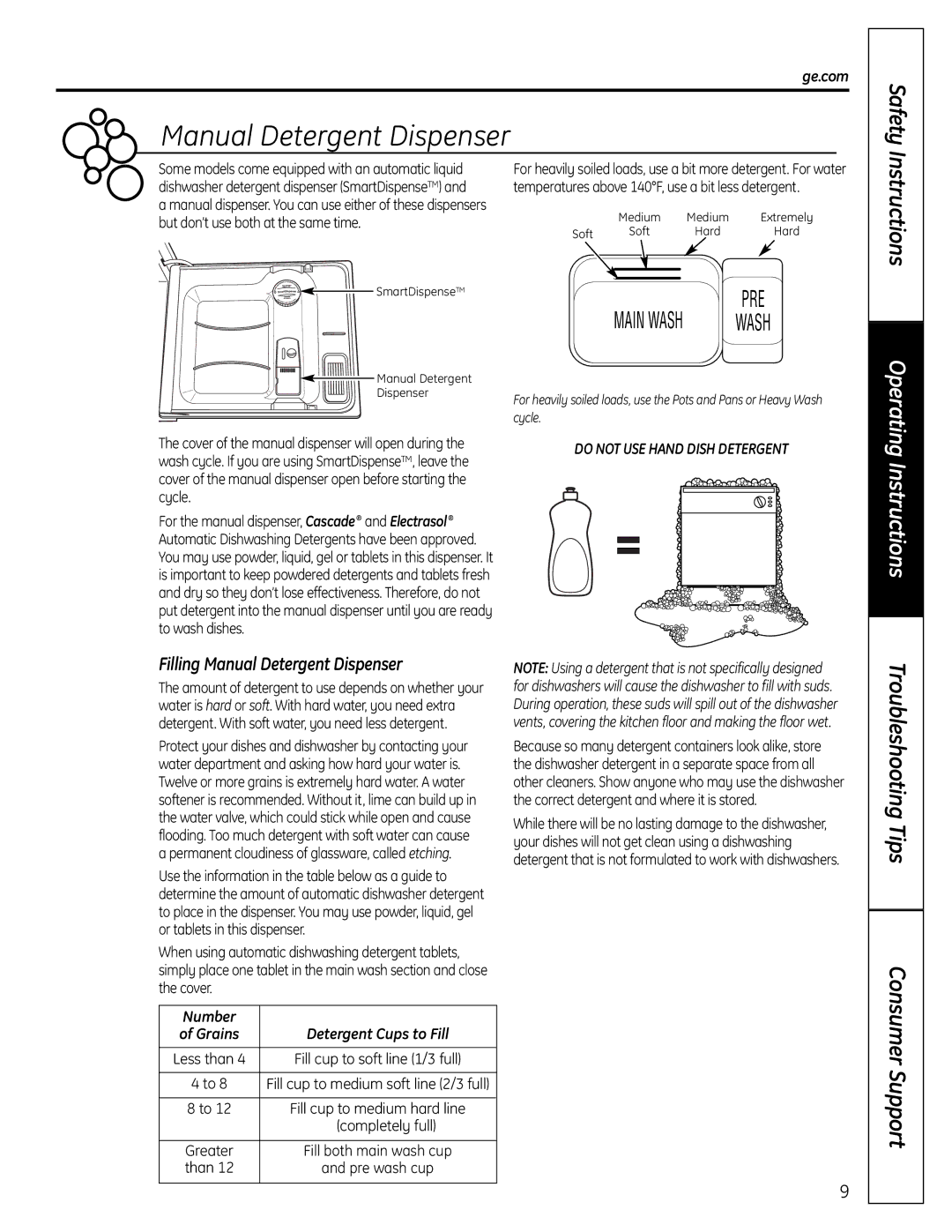
ge.com
Manual Detergent Dispenser
Safety
Some models come equipped with an automatic liquid dishwasher detergent dispenser (SmartDispenseTM) and
a manual dispenser. You can use either of these dispensers but don’t use both at the same time.
![]()
![]() SmartDispenseTM
SmartDispenseTM
![]() Manual Detergent
Manual Detergent
Dispenser
The cover of the manual dispenser will open during the wash cycle. If you are using SmartDispenseTM, leave the cover of the manual dispenser open before starting the cycle.
For the manual dispenser, Cascade® and Electrasol® Automatic Dishwashing Detergents have been approved. You may use powder, liquid, gel or tablets in this dispenser. It is important to keep powdered detergents and tablets fresh and dry so they don’t lose effectiveness. Therefore, do not put detergent into the manual dispenser until you are ready to wash dishes.
Filling Manual Detergent Dispenser
The amount of detergent to use depends on whether your water is hard or soft. With hard water, you need extra detergent. With soft water, you need less detergent.
Protect your dishes and dishwasher by contacting your water department and asking how hard your water is. Twelve or more grains is extremely hard water. A water softener is recommended. Without it, lime can build up in the water valve, which could stick while open and cause flooding. Too much detergent with soft water can cause a permanent cloudiness of glassware, called etching.
Use the information in the table below as a guide to determine the amount of automatic dishwasher detergent to place in the dispenser. You may use powder, liquid, gel or tablets in this dispenser.
When using automatic dishwashing detergent tablets, simply place one tablet in the main wash section and close the cover.
For heavily soiled loads, use a bit more detergent. For water temperatures above 140°F, use a bit less detergent.
| Medium | Medium | Extremely |
Soft | Soft | Hard | Hard |
MAIN WASH | PRE |
WASH |
For heavily soiled loads, use the Pots and Pans or Heavy Wash cycle.
DO NOT USE HAND DISH DETERGENT
NOTE: Using a detergent that is not specifically designed for dishwashers will cause the dishwasher to fill with suds. During operation, these suds will spill out of the dishwasher vents, covering the kitchen floor and making the floor wet.
Because so many detergent containers look alike, store the dishwasher detergent in a separate space from all other cleaners. Show anyone who may use the dishwasher the correct detergent and where it is stored.
While there will be no lasting damage to the dishwasher, your dishes will not get clean using a dishwashing detergent that is not formulated to work with dishwashers.
Instructions
Operating Instructions
Troubleshooting Tips
Number |
|
of Grains | Detergent Cups to Fill |
|
|
Less than 4 | Fill cup to soft line (1/3 full) |
|
|
4 to 8 | Fill cup to medium soft line (2/3 full) |
|
|
8 to 12 | Fill cup to medium hard line |
| (completely full) |
|
|
Greater | Fill both main wash cup |
than 12 | and pre wash cup |
|
|
9
